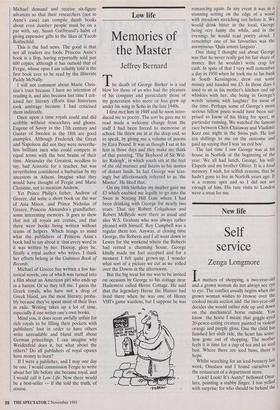Low life
Memories of the Master
Jeffrey Bernard
The death of George Barker is a sad blow for those of us who had the pleasure of his company and particularly those of my generation who more or less grew up under his wing in Soho in the late 1940s.
I first met him in 1949 and he soon intro- duced me to poetry. The sort he gave me to read made a welcome change from the stuff I had been forced to memorise at school. He threw me in at the deep end, so to speak, by giving me a volume of poems by Ezra Pound. It was as though I sat at his feet in those days and they make me think of that painting, 'The Boyhood of Sir Wal- ter Raleigh', in which youth sits at the feet of the old mariner and listens to his stories of distant lands. In fact George was teas- ingly but affectionately referred to as 'the Master'. He liked that.
On my 18th birthday my mother gave me £3 which enabled me legally to go into the Swan in Notting Hill Gate where I had been drinking with George for nearly two years. That day Robert Colquhoun and Robert McBryde were there as usual and also W.S. Graham who was always rather pleased with himself. Roy Campbell was a regular there too. Anyway, at closing time George, the Roberts and I all went down to Lewes for the weekend where the Roberts had rented a charming house. George kindly made me feel accepted and for a moment I felt quite grown-up. I wonder what sort of a picture we cut as we rolled over the Downs in the afternoons.
But the big treat for me was to be invited on occasion by George to his cottage near Haslemere called Herne Cottage. He said that the legendary Herne the Hunter had lived there when he was one of Henry VIII's game wardens, but I suppose he was
romancing again. In any event it was in a stunning setting on the edge of a wood with meadows stretching out before it. We would drink bitter in the local, George being very funny the while, and in the evenings he would read poetry aloud. I remember one of his favourites was the anonymous `Quia amore langueo'.
One thing I thought sad about George was that he never really got his fair share of money. But he wouldn't write crap for cash. In spite of that I very well remember a day in 1950 when he took me to his bank in South Kensington, drew out some money and handed me £3. In those days I used to sit in his mother's kitchen and sip whiskies with her, she being in George's words 'seismic with laughter' for most of the time. Perhaps some of George's more serious fellow poets would have been sur- prised to know of his liking for sport, in particular running. We watched the famous race between Chris Chataway and Vladimir Kutz one night in the Swiss pub. He lost ten shillings to me on the outcome and paid up saying that I was 'an evil boy'.
The last time I saw George was at his house in Norfolk at the beginning of the year. We all had lunch, George, his wife Elspeth and my brother Oliver. It is a fond memory. I wish, for selfish reasons, that he hadn't gone to live in Norfolk years ago. If is a remote spot and so I did not see enough of him. His rare visits to London were a treat for me.


































































 Previous page
Previous page